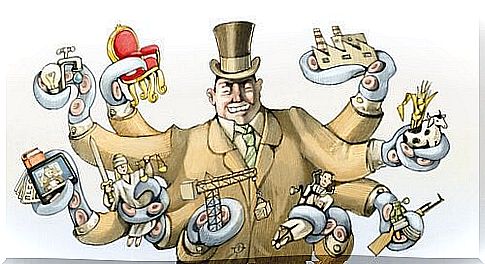From Egoism To Self-love According To Aristotle

Aristotle once wondered, “whether a person should love himself most, or it was better to love others.” This wise Greek philosopher postulated a unique vision of selfishness and its intimate relationship to self-love. Would you like to learn a little more about his individual deduction?
Before we continue, we must say that we will focus on his famous work ” Nicomachean Ethics “. To be more specific, we go directly to Chapter VIII of the ninth book, entitled ” On selfishness or self-love .”
Love for oneself or self-love according to Aristotle
In this chapter of Aristotle’s extensive work , the philosopher comes up with his bid for a virtuous person. In this work, he focuses on the comparison between the love of one’s self or self-love and selfishness.

The philosopher believes that the real facts contradict theories of selfishness. If it is really true that loving his best friend is virtuous, he also claims that we ourselves are our best friends. That is, you are your own best friend. And then he wonders: is it selfish to love oneself? Logically, the closest relationship that can be achieved in any person’s life is the relationship to oneself. In the end, who do we live with 24 hours a day, and who do we have to endure, with mood swings or not?
The two kinds of selfishness according to Aristotle
After the philosopher has established the rules of self-love, he comes up with an explanation of the two types of selfishness. If he really thinks that the term has a derogatory and shameful tone, he also thinks that there is a meaning behind it.
The first kind of selfishness that Aristotle demonstrates is focused on love of worldly things. The philosopher equates this action with that of the village, that is, with the majority, which he calls vulgar. This is undoubtedly the result of an overly class-divided society like the one that existed in ancient Greece.
In this case , Aristotle identifies this first kind of selfishness as a focus on bodily pleasures. In other words, these people keep the greatest riches, honors and goods for themselves. They love to accumulate material things, and the more valuable it is, the better. That is, their only goal in life is to satisfy their passions and desires. And that means, according to Aristotle, that they are listening to the most irrational part of the soul. He observes this as a kind of vulgar custom, regrettable and very low. That’s why it’s a bad option.
But later this classical philosopher says that the persons driven by the greatest justice and wisdom are also selfish. But they are people who seek virtue, hard work and beauty. He sees nothing accusatory in this behavior.
Selfishness makes room for self-love
We will continue to talk about this second kind of selfishness that Aristotle is examining. How can we not call a person selfish if the person dedicates himself, his body and his soul to a search for wisdom, justice and beauty? They must also satisfy their own needs and this is their only goal in life.

Nevertheless, the philosopher attaches great value to these people. That is, he considers the good person to be the most selfish of all. But this selfishness is not harmful, but rather noble. It is not vulgar, for reason is the lord of the person. It will never be passion, as is the case with the previously mentioned group, which focused only on material things.
According to Aristotle , these noble but selfish persons focus on practicing virtue, for this is where one finds joy. And this attitude will ultimately enrich the whole community. This is how they both gain personal benefits and provide benefits to others.
For the Greek philosopher, virtue is the most important attribute of all. So when the virtuous person does what the person is supposed to, and works intelligently and with great sense, there is for the evil person a deep discrepancy between the person’s duty and what the person is really doing.
Conclusion
Here it would be good to conclude that Aristotle believes that the good and noble person is selfish. But from the person’s virtue and righteous behavior, gifts are created that friends, homeland, and society benefit from. It is a committed person who looks down on material wealth but enjoys the benefits of honor and dignity.
Aristotle believes that the righteous person prefers to enjoy a second of pleasure rather than a life of shame. The person is generous and self-sacrificing when required. The person will be able to give up everything for those who need it. This person will have no problem giving up the credit for an action in favor of another person. That is, it is a person who knows how to be selfish and at the same time a person with great self-love.









